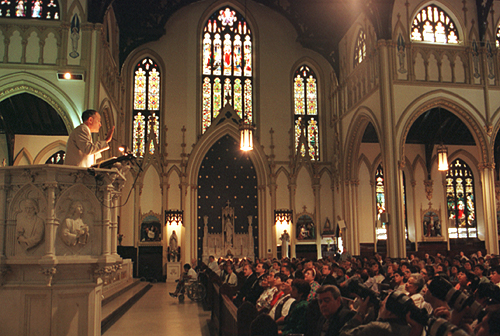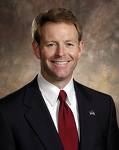 Does it strike anyone other than God-o-Meter as ironic that the Republican candidate most at odds with religious conservatives has a strict moral sensibility shaped by a serious Catholic upbringing? This week’s Newsweek profile of Rudy Giuliani makes a few references to the role that 16 years of Catholic schooling played in informing Giuliani’s authoritarian streak and his deferential relationship to the Roman Catholic Church:
Does it strike anyone other than God-o-Meter as ironic that the Republican candidate most at odds with religious conservatives has a strict moral sensibility shaped by a serious Catholic upbringing? This week’s Newsweek profile of Rudy Giuliani makes a few references to the role that 16 years of Catholic schooling played in informing Giuliani’s authoritarian streak and his deferential relationship to the Roman Catholic Church:
Middle-class Catholic families sent their children to parochial schools if they could. Public school, as depicted in a popular 1955 movie, “The Blackboard Jungle,” was a place where pupils had their lunch money stolen—or worse. At Catholic schools, students wore uniforms and stood when teachers entered the room, and they received daily religious instruction. Rudy won tuition-free admission to Bishop Loughlin Memorial, a fortress-like high school run with an iron hand by the Christian Brothers. When some students played the Everly Brothers’ “Wake Up Little Susie” at a school dance, one of the brothers smashed the record over his knee and announced, “We’ll have none of that filth playing here.”
Corporal punishment was routine at Bishop Loughlin. Adolescent anarchy was a fearful thing; the Brothers beat it out of kids. Some students were afraid. “When you see someone picked up by the shirt and tie and punched in the face, or other teachers throwing chalk across the room—it was very scary,” says Joseph Sicinski, who was Giuliani’s classmate.
Sophomore year, Giuliani’s homeroom teacher was a Christian Brother named Jack O’Leary. Giuliani was more of a talker than a scholar. “I hit him once,” O’Leary tells NEWSWEEK. “He was talking in class and unfortunately—the custom of the time, if someone was fooling around you gave him a whack—and that’s what I did.” Giuliani quieted down. About a year later, in the school auditorium, O’Leary ran into Giuliani’s parents, who introduced themselves. “They said, ‘Do you remember the time you hit him?’ And I said, ‘Yes I do’,” O’Leary replied….
At Bishop Loughlin, Giuliani was a catechist, a student who instructed younger children in Catholic doctrine. Giuliani was not remarkably pious, but like many dutiful boys of his time and background, he seriously considered the priesthood. (He would later joke to friends that he gave up his priestly ambitions because “celibacy ain’t for me.”)….
Under the Christian Brothers’ tutelage, Giuliani was exposed to the Christian Aristotelianism of Saint Thomas Aquinas. As writer John Judis recently noted in The New Republic, “Catholic thinkers do not see liberty as an end in itself, but as a means—a ‘natural endowment’—by which to achieve the common good.” Many years later, at a forum on crime, Giuliani said: “Freedom is about authority. Freedom is about the willingness of every human being to cede to lawful authority a great deal of discretion about what you do.” Asked to explain what he meant, Giuliani replied: “Authority protects freedom. Freedom can become anarchy.” Judis notes that Norm Siegel, then executive director of the New York Civil Liberties Union, said afterward that he was “floored” by Giuliani’s definition of liberty and authority. “But anyone who studied philosophy at a Catholic college would not have been surprised by Giuliani’s words,” writes Judis.
Giuliani’s moralism became increasingly strident in his second term as mayor. He was outraged at an art show at the Brooklyn Museum called “Sensation.” The exhibits included a picture of a black Virgin Mary surrounded by bits of pornography and a pile of elephant dung. Giuliani ordered the museum to shut down the show or lose its city subsidy. He lost in the courts; the show went on. Yet he has stood by his boyhood friend, Msgr. Alan Placa, who was accused of, though never formally charged with, child molestation. (He denies the allegation.) The boy who had grown up with cops and hoods in his family was able to maintain a somewhat selective sense of right and wrong—one influenced by tribal ties.
Giuliani mentioned some formative Catholic experiences in his recent appearance at the Values Voter Summit in Washington. God-o-Meter wonders if if the ex-New York mayor, famously uncomfortable discussing his religion, will make more of his serious Catholic years as social conservatives continue to express skepticism toward him, helping fuel his slipping poll numbers in Iowa, New Hampshire, and South Carolina.
5

